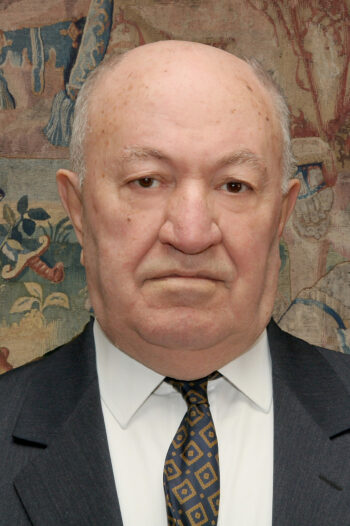Bilandžić Dušan, F.C.A.

Born:
- July 20, 1924, in Maljkovo near Sinj
Deceased:
- March 04, 2015, in Zagreb
Bilandžić Dušan, F.C.A.
Academic titles:
- Fellow of the Croatian Academy of Sciences and Arts
- Doctor of Science
Institutions:
- full professor, retired – Faculty of Political Science, University of Zagreb
- vice president – Republic of Croatia (07/25/1990 – 01/01/1991)
- dean – Faculty of Political Science, University of Zagreb (1974 – 1979)
Functions in Academy:
- deputy secretary – Department of Social Sciences (01/01/2001 – 12/31/2006)
Membership in Academy:
- fellow – Department of Social Sciences (07/24/1991 – 03/04/2015)
- extraordinarry member – Department of Social Sciences (05/19/1988 – 07/24/1991)
- associate member – Department of Social Sciences (03/31/1980 – 05/19/1988)
Dušan Bilandžić, F.C.A., a prominent Croatian historian and politician, was born on July 20, 1924, in Maljkovo near Sinj. In Sinj, he attended the lower grades of the Franciscan gymnasium, while he attended higher grades at the gymnasium in Osijek.
He participated in the anti-fascist struggle from 1942 to 1945 as a fighter and political commissar of a company and battalion in Slavonian partisan units. From 1945 to 1960 he served in the JNA as a teacher of the history of wars in military schools. In 1955, he graduated from the Faculty of Law in Belgrade as an outstanding student in a “conspiratorial” way because the military authorities forbade their officers to study at universities.
To devote himself to researching social processes and due to certain political disagreements, in 1960 he left the JNA and began investigative work on problems of social development, first as a journalist and then as the head of the group of the Union of Trade Unions of Yugoslavia for Self-Management.
In the mid-1960s, he participated in political and expert teams for designing and monitoring economic and social reform (1964-1967) and at the same time attended postgraduate studies, which he completed with a doctorate in economics at the University of Zagreb in 1965. In the same year, he was elected a member of the Presidency of the Union of Trade Unions of Yugoslavia as a representative of Croatia.
By agreement with the Croatian leadership, he came to Zagreb in 1967 and took over the position of director of the Institute for the History of the Workers’ Movement, which until then was led by Franjo Tuđman. By the decision of the Presidency of the SKJ, he was appointed director of the Center for Social Research in Belgrade in 1969 with the task of gathering scientific institutions and individuals from all republics to develop the conceptual and theoretical basis for the reform of the federation in 1971 and the drafting of the Constitution in 1974. After the adoption of the Constitution, he returned to Zagreb at the Faculty of Political Science where he was elected professor. He was also dean from 1974 to 1979. From 1968 to 1982 he was a member of the CC UCC and a member of the three convocations of the Parliament of the Socialist Republic of Croatia. He was not re-elected to these positions, since after the adoption of the constitution in 1974, he became more engaged in the fight against ideological dogmatism, unitarianism and centralism. After leaving the state-party structure in 1982, he became more engaged in scientific work.
He returned to active politics in December 1989, when he was re-elected as a member of the Central Committee as a member of the reform current at the 11th CONGRESS of the UCC, and at the first session of the multiparty and democratic Parliament on May 30, 1990, he was elected a member of the Presidency of the Socialist Republic of Croatia. After the constitutional amendments adopted on July 25, 1990. he became vice-president of the Republic of Croatia and held that position until 1 January 1991. As a patriot, he became involved in the process of creating an independent Croatian state. From 1994 to 1996 he was an advisor in the Office of the Republic of Croatia in Belgrade.
He was elected an associate member of the Academy in 1980, an extraordinary member in 1988, and in 1991 he became a full member of the Croatian Academy of Sciences and Arts, where he was very active. From 2001 to 2006 he was secretary of the Department of Social Sciences and a member of the Presidency of the Croatian Academy of Sciences and Arts.
As a historian, Academician Bilandžić was mostly concerned with the history of Yugoslavia and the position of Croatia in it. His most important works are Ideas and Practice of Social Development of Yugoslavia (1973), History of SFRY 1918–85 (1985), Yugoslavia after Tito (1985), Croatian Modern History (1999), War in Croatia and Bosnia and Herzegovina (1999), The Fall of Yugoslavia and the Creation of Modern Croatia (2001) and History Up Close (2006).